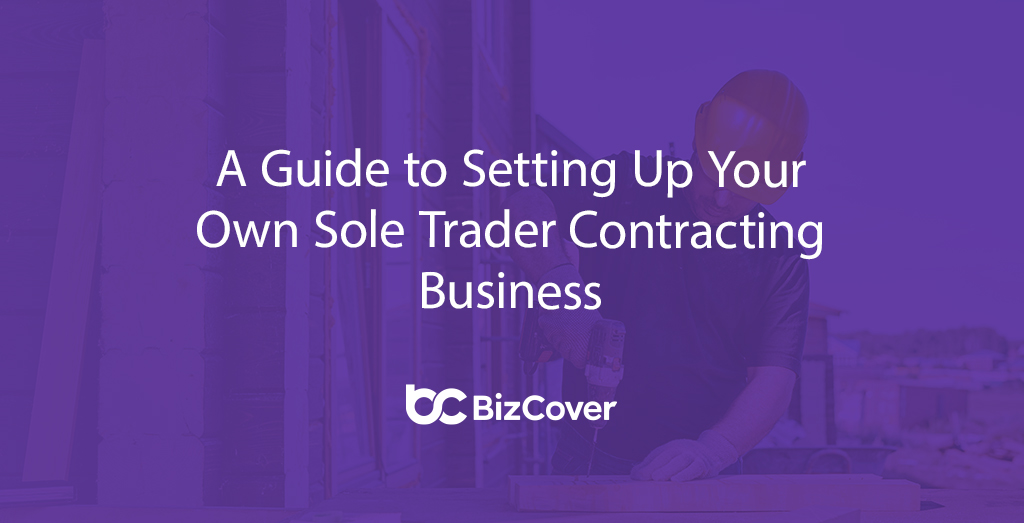How to set up your own sole trader contracting business
Becoming a sole trader and starting your own self-employed business can be a highly rewarding and fulfilling journey. The Australian economy is overwhelmingly made up of small businesses (97.2%), with around 62.5% of these being self-employed sole traders. And there are plenty of advantages to becoming a sole trader, such as:
- You are your own boss: Full control over decisions, schedule, and business direction.
- Simple and affordable to set up: Minimal registration and compliance requirements.
- You keep all the profits: No need to share earnings with partners or shareholders.
- Flexible working hours: Ability to work around your lifestyle and commitments.
- Low running costs: Operating and administrative expenses are generally lower.
- Simpler tax reporting – Business income is reported on your personal tax return.
If you’re considering becoming a sole trader and launching your own business, then read on for some steps to help you to get started and other helpful tips.
Steps to set up your own sole trader contracting business
Starting your own contracting business as a sole trader in Australia can be a rewarding way to work independently, take control of your career, and build your own client base. While it’s simpler than establishing a company, there are still several important steps to get your business off the ground properly and legally. For example:
1. Choose and register your business name
Decide whether you want to trade under your own name or a separate business name. If you want to use a unique business name instead of your own name, you will need to register it with the Australian Securities and Investment Commission (ASIC). Before registering, you should also check that your desired name isn’t already taken using the ASIC Business Name Register.
2. Apply for an Australian Business Number (ABN)
An ABN is essential for operating as a sole trader. You’ll need it to issue invoices, claim tax deductions and register for GST (if required). You can apply for an ABN online through the Australian Business Register (ABR). The process is free and typically fast.
3. Register for Goods and Services Tax (GST) if necessary
You only need to register for GST if your annual turnover is $75,000 or more. If your income reaches this threshold, register for GST at the same time as your ABN or later through the Australian Taxation Office (ATO). Charging GST requires you to issue tax invoices and report GST in your Business Activity Statements (BAS).
4. Set up a business bank account
Even though you are beginning a self-employed sole trader business, you may wish to keep your business and personal bank accounts separate. Having a business bank account that is separate from your personal account can help you to keep track of business income and expenses, simplifies bookkeeping, and makes tax time much easier. A business account also presents a more professional image to clients.
5. Get the necessary licences, permits or registrations
Depending on the type of contracting work you do, you may need specific licences or permits. For example, electricians, builders, and plumbers require trade licences in addition to your ABN. Use the Australian Business Licence and Information Service (ABLIS) to check exactly what applies to your industry.
6. Consider business insurance
As a sole trader, there’s no legal distinction between you and your business. This means you’re personally responsible for any debts or losses the business incurs. If something goes wrong, your personal assets (such as savings or property) could be at risk. You can help to protect your growing sole trader business with business insurance, such as:
- Public liability insurance: Covers you if a third-party claim that your negligent business activities caused them injury or property damage.
- Professional Indemnity insurance: Covers you for losses claimed by a third party and defence costs due to alleged or actual negligence in your professional services or advice.
- Personal Accident & Injury insurance: Provides a weekly income benefit following an accidental injury or illness once signed off from work by a medical practitioner for a set amount of time.
7. Set up record-keeping and accounting systems
Keeping accurate records is essential for tax compliance and business success. Track your invoices, receipts, and expenses carefully. Accounting software can help to simplify this process. Good record-keeping also makes it easier to prepare end-of-year tax returns, BAS statements and financial reports.
8. Decide on your pricing and contracts
As a contractor, it’s important to set clear pricing for your services. Decide whether you’ll charge hourly rates, fixed project fees, or a combination of both. Draft contracts or service agreements to clearly outline scope, payment terms and responsibilities. Contracts protect both you and your clients and can help avoid disputes down the track.
9. Market your business and find clients
No business can survive without clients. Start by:
- Building a professional website and LinkedIn profile.
- Networking with industry contacts and attending local events.
- Asking satisfied clients for referrals and testimonials.
- Listing your services on job boards or contractor platforms relevant to your industry.
10. Build relationships with your clients
Strong client relationships are the backbone of any successful contracting business. Delivering high-quality work on time and maintaining clear, professional communication helps build trust and encourages repeat business.
Take the time to understand your clients’ needs, listen to feedback, and be responsive to questions or concerns. Going the extra mile – whether through personalised service, helpful advice, or proactive updates – can help set you apart from the competition.
Next steps: What to do after you’ve begun your business
Now that things are moving along, there are other obligations and responsibilities you also need to take into account. For example:
Stay compliant with tax and super obligations
As a sole trader, you report your business income on your personal tax return. You may also need to make quarterly PAYG instalments to the ATO. Plus, don’t forget your superannuation. Even if you don’t employ staff, it’s wise to contribute regularly to save for your own retirement.
Review business performance and adjust regularly
Regularly review your financial performance, client base, and workflow. Adjust your pricing, marketing and operations as needed to grow sustainably. Continuous improvement is key to long-term success.
It also pays to regularly review your insurance policies. As your business evolves and changes, your policies may also need to be updated to match your new business requirements. This can help you avoid underinsurance.
Retain loyal customers
Building long-term relationships can transform one-off clients into loyal supporters and steady sources of work – which you’ll need to continue building a successful business.
Satisfied clients are more likely to provide referrals and positive testimonials, which are invaluable for growing your business. Consider keeping a contact list, sending occasional updates or newsletters, and maintaining ongoing communication even after a project is complete.
Budgeting tips for sole traders
Managing your finances effectively is absolutely critical when running a sole trader business. Staying on top of your budget helps you plan for taxes, cover expenses and ensure a steady cash flow. Aside from keeping your business and personal bank accounts separate, here are a few more practical tips:
- Set aside money for tax and super: Regularly put aside a percentage of your income to meet ATO obligations.
- Plan for variable income: Account for months with lower earnings by building a cash buffer.
- Track expenses carefully: Use accounting software or spreadsheets to monitor spending and claim deductions.
- Review your budget regularly: Reassess your income, expenses, and savings goals to stay on top of your finances.
These simple steps can help you maintain financial stability and focus on growing your business with confidence.
Ready to start your own business?
If you’re ready to start your own sole trader business, then make sure you consider what kinds of insurance you may need to help safeguard your assets and livelihood.
BizCover offers a wide range of business insurance options for sole traders just like you. From dog groomers to gardeners, IT consultants to plumbers, we can help you get fast, free and easy insurance quotes from some of Australia’s leading insurance providers. Get an insurance quote online today and find out how much you could save.
This information is general only and does not take into account your objectives, financial situation or needs. It should not be relied upon as advice. As with any insurance, cover will be subject to the terms, conditions and exclusions contained in the policy wording or Product Disclosure Statement (available on our website). Please consider whether the advice is suitable for you before proceeding with any purchase. Target Market Determination document is also available (as applicable). © 2026 BizCover Pty Limited, all rights reserved. ABN 68 127 707 975; AFSL 501769.



